#greatest line in literature history
Text
Whenever I think about the Left Behind movie, I get mad. Not because it's bad or anything, but-- we could've had primo dumb B-movie horror. We could've had Nic Cage playing the Antichrist. But they just decided to cold everything so straight and it sucks.
These are books in which the fucking earth cracks open and scorpions with human faces screaming ABBADON come out and bite people. The sea turns to blood. There's a bunch of earthquakes, half the people are dying every like five weeks, the sea turns to blood, boils appear on everyone, and that's not even going into the Antichrist.
Like-- even in the books the Antichrist is one cracker short of a stack. He's the Antichrist, what do you expect, but this is also the same guy that shoots the equivalent of Jeff Bezos in front of a board of directors and then just fucking brainwashes everyone into believing the opposite of what happened. This is the same guy that somehow manages to get the UN to have power. THE UN. And everyone just agrees to go along with it. He bathes in pig's blood on live television, he rebuilds and redestroys Israel's temple, he literally creates a secret police, he starts making mass executions of people who don't get the Mark. Not even conspiracy "oh microchips are killing us off" no, like guillotines next to the Mark station sort of executions. At one point he straight up gets possessed by Satan himself, reanimates from the dead on live television and creates an entire global religion bent around him, including giant ass statues that have a fire at the bottom that is fed via Bible pages. It's so insane. And think about it, he could've been played by Nic Fucking Cage! Imagine that, Nic Cage doing that, applying his amazing whole-ass emotional acting in service of getting possessed by Satan.
Imagine trying to adapt all that to film, having Nicolas Cage in the palm of your hand, being able to make all the B-movie Bibicial schlock you want--
And you play it all completely straight and cast Nic Cage as the generic do-gooder pilot.
This is Biblical highway robbery I swear.
#left behind#I DUG THIS OUT O MY DRAFTS AND YKNOW WHAT IM POSTING IT#ITS STILL BIBICAL HIGHWAY ROBBERY#I WANTED TO SEE THE ENDING SHOWDOWN WHERE CHRIST COMES AND EVICERATES EVERYONE IN A FOUNTAIN OF GORE#AND GUTS AND EVERYTHING#I WANTED O SEE THE DEVIL COMING OUT OF NICK CAGE AHHH#ofc i will mention the series does have antisemetism and islamophobia and white supremacy out the wazoo#including the greatest blow off line in the history of literature#but i think that embracing the core violence of the books and focusing on it#like a b roll of end times violence#instead of actually focusing on any of the mary sue characters or anything#it would've been schlocky and great#look man i just want nic cage as the antichrist GIVE ME NIC CAGE AS THE ANTICHRIST
0 notes
Text
Rhaenyra and Feminism
I find it so funny how TG stans go on and on about how Rhaenyra wasn't a "feminist", when they're supporting team male progeniture. Like sure, Rhaenyra wasn't out there reading/writing feminist literature and manifestos against the patriarchy, but who was? Definitely not their beloved Alicent, their rapist king, or their misogynistic kinslayer/war criminal.
Let's do a quick history lesson, shall we? Queen Elizabeth I, the second ruling queen of England and one of the greatest rulers of that country. One of her most famous acts was the execution of Mary Queen of Scots. Does that make her an evil person who is a sign that her father and the other supporters of the patriarchy were right, that a woman isn't fit to rule? Now, we also have no records of Elizabeth interfering with the succession choices of her lords or making laws that women should be treated equal to men. Does this mean her reign was meaningless or even harmful to the feminist movement?
The answer to both these questions is fuck no. Elizabeth simply ruling was a huge step for the feminist movement. She showed that a woman could rule just as well if not better than a man.
Now a greenie could argue that Rhaenyra wasn't a good ruler, to which I answer, she never had a chance to properly rule. Had Rhaenyra ascended undisputed there would have been no need for any of her unpopular decisions (i.e. the heavy tax, Nettles' execution, etc.) Her reign would have set a precedent that a female heir is acceptable and the change would ripple out from there, much like it did with early female rulers in the real world.
As for why Rhaenyra didn't support Baela and Rhaena, that wasn't her decision, it was Corlys'. Corlys had decided that Driftmark would pass through Laenor's line not Laena's and he rejects any of Rhaenys' suggestions to the contrary in the show. Lucerys had been accepted by Laenor, Corlys, and Viserys as Laenor's legitimate heir, so that's the end of it. Corlys even had the chance to name Baela or Rhaena heir after Luke's death, but instead he chose Addam and later Alyn, two bastards who were, supposedly, of Laenor's line. Now, am I saying that I agree with Corly? No, in fact I really don't like him, but who his successor would be is his decision.
For Rhaenyra to step in and force him to change his mind would not only destroy what's left of any goodwill between the Targaryens and Velaryons (which her father put the responsibility of on her by forcing her to marry Laenor) but also would make the lords of Westeros a reason to revolt. Aegon I allowed the lords to exercise almost the same amount of power they did before the Conquest, part of that is the choice over who would succeed them. As for Luke being heir, Rhaenyra never forced Corlys to acknowledge him and affirm him as heir, that was, once again, his choice. He could have chosen to speak out against her and declare the boys bastards, with the support of Rhaenys, which would force Viserys to either remove Rhaenyra as heir or at least remove Luke from the line of succession. Or a much easier move would have been to remove Laenor as heir to Driftmark and give the position to Laena, yet Corly never did either of these things.
Yeah, Rhaenyra chose to embrace the opportunity this gave her, why wouldn't she? That's a political move that strengthens her claim in the face of the Greens' constant undermining and plotting. Literally every ruler in Westeros does shit like that, that's how the world works, if you want to rule, you need to play political games of some kind.
And before any of the greenies try to bring up the time when some lords brought a question of succession before Rhaenyra during the Dance, let me cover that real quick. Rhaenyra was in the middle of a war and knew full well that most of the lords would be willing to turn on her quickly, something she couldn't afford. So yes, she chose to support the male heirs over the lords' daughters, because she knew that was what the lords wanted and she needed their support. Again, had she not been at war, she wouldn't have had to make this choice and we can't know what she would have done.
Now, to conclude this rant: Rhaenyra wasn't a modern or suffrage era feminist, but that doesn't make her an anti-feminist tyrant. She would have been the beginning of a shift in the misogynistic ideals set so steadfastly in Westeros as her reign would set a precedent for future ruling queens. How could she have our ideals of feminism when the roots of them had barely begun to develop? That's an impossible expectation to put on her and the most hypocritical argument anyone could have. TG usurped Rhaenyra because they wanted to further uphold the patriarchy and none of them cared about the women of the realm or even the people. Maybe you should look at your precious team before you try to defame the rightful queen.
#rhaenyra targaryen#anti team green#anti team green stans#team black#anti alicent stans#baela targaryen#rhaena targaryen#asoiaf#house of the dragon#corlys velaryon#anti rhaenyra antis
74 notes
·
View notes
Text
So I finally read "Red, White and Royal Blue" by Casey McQuiston, and although it's not the greatest piece of literature ever written (I mean, I wasn't really expecting it to be), and it's very flawed, it was fun and funny and I might reread it. Also it's a rom-com, and I'm very selective about rom-coms, but this one passes.
Then I watched the movie, and it was underwhelming, for obvious reasons. I mean, of course the book was better because it usually is; and although I liked the pacing at first, after the halfway point it careened off like a shopping cart with a crazy wheel going downhill. And the omission of certain plot points and characters was very odd, and even Stephen Fry was underwhelming (I didn't think that was possible).
Buuuuuut... my god, it was worth watching just for the chemistry between Taylor Zakhar Perez and Nicholas Galitzine. There are some bantering moments in there that had me squealing into a cushion like a giddy teenager. And the Paris scene? Beautiful. All the heart-to-heart moment were lovely. They don't make rom-coms like this anymore...
Also worth watching for Taylor Zakhar Perez himself, and I'm distraught that his eyelashes didn't get their own line in the credits. Also Shaan Srivastava, who got an unfairly tiny amount of screen time for someone that handsome. Same for Nora, who was adorable and underused.
My favorite moments: Zahar's panic attack in the hotel room, Zahar's call to Shaan, Zahar's pillow attack... Basically Zahar in general. Also David. Also Amy.
OH AND THE CAKE SCENE! THAT WAS SO GOOD! VERY WELL EXECUTED. TEN POINTS.
Most heart-wrenching moment: any moment when Nicholas Galitzine looked tortured, but especially that whole pier scene.
Weirdest change: Miguel. Who the fuck decided that... Also I'm sad that the "History, huh?" quote didn't make it onto the emails and therefore didn't make it onto t-shirts either...
Anyway, it was still worth a read and a watch.

#red white and royal blue#rwrb#rwrb book#rwrb movie#taylor zakhar perez#nicholas galitzine#casey mcquiston
33 notes
·
View notes
Text
Day 3 Adoption || Learning
Damian smiled as he laid on the couch, Cecilia fast asleep on his chest as he read his chapter for his Art History class. He was currently holding the book in the air, making sure to box in the baby as he read through the words, although none of it was actually sticking with him if he was going to be honest with himself. He was slightly too captivated by the soft breaths that escaped his daughter’s mouth every few seconds.
While he was still annoyed with his mother for going and creating a clone child without his or Danny’s consent, he also couldn’t be too angry at her either. Damian had never felt so happy so at peace in his life. This precious little girl was probably one of the greatest gifts he had been given and he was going to treasure her for the rest of his existence. And he knew that Danny felt a similar way considering the way his boyfriend would just hold Cecilia close to his chest and whisper in her ear just how much he loved and adored her.
Yes. they were both completely and totally captivated by this little girl and she had only been in their lives for two weeks now.
Classes had just started up for the fall semester and the two were finally getting to see if their idea for a routine would work for the couple and their daughter. It was currently morning, ten in hte morning to be precise and Danny was in his Critical Thinking and Literature class while Damian was home with the baby. He had just woken from his post patrol’s nap and thankfully his daughter had been more than happy to just sleep in that morning. Thankfully she was a rather easy baby to deal with. He would soon have to wake her up so that he could get her bottle prepared and have her fed and bathed for the day. He wasn’t entirely sure what their plans for today would be.
He hadn’t really thought that far ahead quite yet but he figured anything would be fine. Danny would be done with classes at twelve thirty and then Damian would head to campus for his own classes at one thirty where he would be until nine in the evening and then come back to change for his nightly patrols as Robin.
Danny would have her from that time and would send Damian hourly photos of their precious little girl so that he would be able to actually concentrate on what was going on in class rather than worrying about the baby. And worry he did.
Damian hated being away from Cecilia. He knew how dangerous this world was and he didn’t like the idea of anything happening to his girl. He was thankful, though, that he happened to be dating an eldritch horror who had absolutely no problem destroying anyone who dared to lay a hand on their daughter.
Danny had been horrified at first when he had learned just how protective ghosts were of their children, apparently, they would be willing to cross any lines to protect them and Danny was the same way with their daughter. He had been embarrassed at how he had behaved in front of Damian’s siblings but Damian had to admit, he first off found it insanely attractive, and second, he found it comforting to know that even his gentle boyfriend would do anything that was necessary to keep their daughter safe and sound. It had DAmian feeling far more assured of his daughter’s safety and wellness.
Maybe he was just paranoid but he was constantly worried his mother was up to more than she said she was or that this entire thing was far too good to be true. But Danmian tried his best to stay positive, to remind himself that no, his mother had actually done this to be kind in her own, strange, special way.
Even if it was a little strange to gift the two a daughter after only six months of dating but it was Talia, it made perfect sense for the woman to do something like that.
Damian looked away from his book as he felt his daughter start to stir on his chest and looked down at her and smiled.
“Hey little one,” he murmured, setting his book to the side before he picked her up and cradled her close as he sat up on the couch. “Did you have a good nap?” He cooed, running his fingers through her hair, trying to fix the knots that had formed in her sleep. Little eyes opened to show her heterochromatic eyes and Damian smiled.
She was unique and absolutely beautiful. One blue eye and one green. He cooed at her some more as he stood up and started towards the kitchen where he set her in her little chair, fastened her in, and started getting to work on her bottle. He quickly went through the motions of pouring the powdered substance into the water and shook the bottle up slightly before he put it in the warmer for her. He then went back to the baby, picked her up, and smiled.
“You smell disgusting,” he said bluntly. “I wanted to change your diaper that entire time you were napping but I feared that it would wake you up and upset you,” he said as he carried her to her nursery to get started on changing her disgusting diaper. He crinkled his nose as he wiped her butt and threw everything in the garbage before he thoroughly sanitized his hands and dressed her in a blue onesie and black pants, the pants showing a little Nightwing insignia on the butt. He shook his head at the outfit sighting at his brother’s ridiculousness for gifting Cecilia something so stupid.
If Damian had it his way, his darling daughter would never be a vigilante or be a part of the lifestyle. He and Danny had already agreed that it was not something they wanted her wrapped in and would do everything they could to give her a normal life.
Damian was already prepared to step down as Robin if the need came. He would never in a million years put his daughter through something like that, not if she didn’t have to be a part of it, at least. He left his daughter laying on the changing table to cross the room and grab a pair of socks and shoes for her and let out a gasp as he turned around to find her gone.
“Cecilia?” He called when he heard a soft gurgling that sounded just like his daughter. “Darling? Where are you?” he asked, looking around the room when the gurgling sounded again, this time above him. Damian looked up to find the little girl floating mid-air and let out a gasp.
He was going to murder Daniel and his ridiculous ghost powers. Damian immediately jumped into the air and grabbed her, cradling her tight to his chest as he started searching for his phone.
This was bad, this was very bad. If Cecilia had inherited her father’s powers of flight, what other powers of his did she get? Could she disappear? Could she go intangible and density shift the way Daniel did? How had they not realized that she had ghost powers? This felt like a massive oversight on their part for not even thinking about the possibility of Cecilia becoming half ghost like her father!
But was she truly a halfa or was she just a quarter considering Damian had no ghostly gifts of his own? Was the fact that he had died enough to be a recessive gene? Damian didn’t know! For all his talents, unfortunately, biology was not something he was advanced in! He had passed the class in high school of course but that had been years ago.
Damian found his phone setting on the coffee table in the living room and immediately called his boyfriend. He sighed as it rang and rang and rang, no answer coming from his beloved as he went to voicemail. Damian cursed before apologizing to his daughter and called his boyfriend once again.
“Dami? I’m in class, what’s going on? Is Cecilia okay?”
“I need you to get home right this instant Daniel! We had an oversight!” Damian rushed out, still clutching Cecilia to his chest, afraid to let go for fear of her turning intangible or flying off once more. At least like this, she was calm and barely moved too much.
“What’s going on?”
“She has powers!”
Danny was quiet for a moment. “I’m coming home right now,” he said. “In my room in the top drawer, there is a box of ghost tech. I know it looks sketchy but there’s like a bracelet kinda thing, put that on her wrist and press the button. It’ll keep her from being able to use her powers until I get there,” Danny said.
“Okay, why do you have something like that?” Damian asked, clutching Cecilia to his chest as he walked to their bedroom and went through the drawer Danny was talking about and found the bracelet. It was god awful and wouldn’t fit his daughter’s wrist.
“Ghost hunters for parents, Dami. I took some of their stuff with me when I left,” Danny said with a laugh. “Did you find it?”
“Daniel, this won’t fit her,” Damian said.
“Just put it on Babe,” Danny said with a sigh as the wind started to whistle through the phone.
“Are you flying?” Damian asked, surprise lacing his voice. Danny very rarely used his powers these days. Despite Damian constantly trying to assure him that his father wouldn’t mind, Danny stayed worried that Batman would be pissed about a meta-adjacent person in his city.
“Yes! I’ll be home in just a few minutes, now put the bracelet on and press the button.”
Damian sighed but did as his boyfriend said and put the giant bracelet on his daughter’s tiny hand and pressed the button. It lit up and suddenly a green hue surrounded the girl.
“What is this?”
“A ghost shield, personal ghost shield to be exact, she can’t escape it without you pressing that button. Don’t worry she can still breathe and all that jazz,” he said. Damian just let out a huff and looked at his daughter’s little face.
“I knew that things were far too easy for us,” he said with a chuckle. “You were going to find something eventually to stress me and your daddy out, huh?”
The little girl just stared up at him, shoving her hand in her mouth. Damian smiled and shook his head as he walked out of the room and back to the kitchen to get her bottle and get the poor thing fed so that she wouldn’t eat her own hand.
Damian grabbed the bottle and curled up on the couch just as Danny appeared through the ceiling like the barbarian he was and looked between Damian and the now-drinking baby. He took a seat beside them and made grabby hands for the baby. The man was in his ghost form, a sight that Damian rarely saw but damn was he attractive in that form. There was just something about how powerful he looked with those bright green eyes and sharp fangs that just got to Damian.
Damian sighed and placed her in his hands. Danny smiled at her and tickled at her small little fat roll under her neck.
“She has a tiny little core,” Danny said, pressing his hand to her chest before he phased it through and pulled a small object the size of a marble out.
“Won’t she die without that?” Damian shouted, alarmed.
Danny shook his head. “No, she’s mostly human, Dames. This little thing is literally just giving her some ghost powers and that’s it. But even then, since I’m her ghost parent, I have the power to hold it and check on it when I need to. It’s a ghost parent thing,” Danny explained, turning the marble-sized core around this way and that in his hands. “She’s only a very small part ghost since you’re completely human and I’m half. I don’t know the science behind all of it but she’ll never turn into a ghost or have a second form. I imagine she’s just going to have some of my powers, flight, invisibility, the basics. I don’t even know if her core is actually going to give her a special gift.”
“A special gift?” Damian asked.
Danny nodded and pressed the core back into their daughter’s chest, his hand turning intangible for a moment before he pulled it back and wiggled his fingers a little, snow sprinkled down from his hand, a small smile on his face as it did.
“My core is an ice core,” he explained. “Which gives me ice powers. Lia’s is just pure ecto so I’m gonna take a bet that it’s just because she’s still half me and got some of my ectoplasm when she was created. When my other clone was created, she was made of me and just me so she was also a halfa. Her core was different than mine, though, since she was her own person. If I recall, it was a wind core.”
“Was?” Damian asked, looking down at his baby, a sudden lump in his throat.
“Yes, she died a few years ago,” Danny said quietly. “But she wasn’t a clone like Ceceilia is, she was created by a madman who didn’t know what he was doing and she was too unstable. Cecilia is stable, I can feel it in her, she’s got enough human in her that she’s not at risk of destabilizing the same way.”
Damian nodded before he pulled his daughter back to him from Danny, feeling a sudden urge to hold her tight. He had this baby for less than a month but if anything happened to her, Damian was sure he’d destroy the entire world. He didn’t know how Danny didn’t do something drastic when his last clone had died, it sounded like he cared about her a lot.
“I’m sorry, about your clone,” Damian said softly.
Danny just gave him a small, sad smile. “She was surrounded by the people who loved her,” he said softly. “She wasn’t alone when she destabilized.”
“I’m glad you got to be there for her, then,” Damian said, leaning over to give Danny a soft kiss. “I love you, thank you for getting here so fast.”
“I love you too,” Danny said with a small smile, that sad look still in his eyes as he looked at Cecilia. “Now, just keep onto her, I’m going to go ghost-proof our house so someone doesn’t accidentally phase through the ceiling while we’re asleep.”
“You just had to put that fear into my mind,” Damian said with a sigh as Danny got off of the couch and ran back to their room.
“Sorry!” He called back at him. Damian sighed and curled up with Cecilia as she continued with her bottle.
“Your daddy is a mess,” Damian said with a chuckle. “But we love him anyway.”
@dpxdc-familyweek
Part 1
Part 2
58 notes
·
View notes
Text
Have you ever heard the term ‘Pyrhhic Victory’? It’s a victory in which the cost outweighs the gain. When there is so much loss that it overshadows the win.
There are many examples in ancient Greek and Roman literature, or in their history. Virgil’s Aeneid subtly criticizes the cost it took to build this life, “So heavy is the cost of the founding of Rome”. And, of course, the very founding of the term- the Pyrrhic War of 280BC.
I promise I have a point here. There are countless wars in Greek and Roman history where the struggle is considered null, where the win cost too much for it to be worth it. But I think about this in relation to the 2nd Titan War in ‘The Last Olympian’, specifically the Battle of Manhattan. They won, right? It was a success?
I don’t think it was a success to all.
The greatest loss of this war were the Apollo kids. So many of them weren’t actually on the front lines, and yet they suffered the greatest loss. By the end of the war, Will was the oldest camper in his cabin.
He was fourteen years old.
The only known Apollo survivors of the war were Kayla, Will and Austin. There may have been more, or that may have been it, but what we know for certain is that the Apollo Cabin lost the most. They had the most casualities, the most loss.
They spent the next day healing the wounded, unable to mourn the loss of their siblings. Will took over as the leader of his cabin midway through a war. Kayla, 12, and Austin, 13, had to go and recover the body of their older brother.
They never found him.
I think constantly about the way they are undervalued and underestimated. The way people may think lesser of them for not always being fighters. And then I think about the fact that the healers suffered more in this battle than anyone. And they did so quietly.
So, yes, the Second Titan War was considered a victory.
But I wonder if the Apollo Cabin felt the same?
#will solace#apollo#percy jackson#percy jackson meta#pjo#kayla knowles#austin lake#percy jackson olympians#the second titan war#the battle of manhattan#the last olympian#michael yew#lee fletcher
118 notes
·
View notes
Text
Gathering of the Greatest Gumshoes - Number 9
Welcome to A Gathering of the Greatest Gumshoes! During this month-long event, I’ll be counting my Top 31 Favorite Fictional Detectives, from movies, television, literature, video games, and more!
SLEUTH-OF-THE-DAY’S QUOTE: “How do you think this all works? By being big and being bad.”
Number 9 is…Bigby Wolf, from The Wolf Among Us.
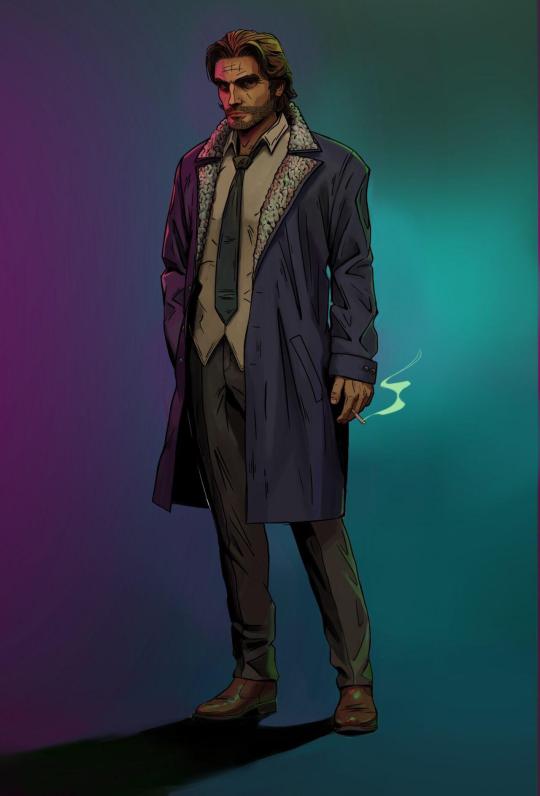
“The Wolf Among Us” is a video game made by the now-defunct developers Telltale Games. The game was based on the comic series “Fables.” I’m going to come right out and say it: I have never read the comics, and I have basically no real knowledge of them or how the characters and lore in them may differ from the established points in “The Wolf Among Us.” HOWEVER, very thankfully, the game is able to stand up on its own two feet regardless, and so are its characters, so even someone who has basically no knowledge of the source material can still enjoy it.
The game is a sort of choose-your-own-adventure sort of deal; a point-and-click adventure where the player’s choices every step of the way affect how the story plays out, the kinds of relationships you form with other characters, and so on. Some choices are more important than others, but virtually every choice of note is worth pondering. The plot is a combo of film noir crime story and dark fantasy: it takes place in a world where various characters from the world of fiction, after their universe was mysteriously destroyed, have fled to the “real” world in order to seek refuge. They’ve established their own city, called “Fabletown,” where real world problems combine with fantastical adventures, as they struggle to build new lives and survive in this different universe, and hide their identities from the “normies” who exist beyond the borders of the city.
The main character is Sheriff Bigby Wolf. Bigby, as you may have guessed from his name and the title, is the Big Bad Wolf of fairy-tale infamy himself. In the world of the game, Bigby is a werewolf, who can transform from a human to increasingly more wolf-like forms, his true and ultimate form being a GIGANTIC feral beast bigger than elephant, able to create hurricane-force winds with his breath alone, and more than capable of swallowing a person whole. Needless to say, with this kind of setup, and his reputation as one of the greatest, most archetypal villains in history, Bigby isn’t exactly a popular Sheriff. Many fear or distrust him, and those that don’t typically still keep their distance for one reason or another.
Because of the playstyle of Telltale games, Bigby’s exact personality can shift depending on the choices the player makes: he can be sort of a gentle giant, who looks rugged and tough but really isn’t that bad. In contrast, he can be much more morally and ethically dubious, an anti-hero closer to Dirty Harry, who walks a very fine line between a man and a monster. However, regardless of the choices you make, a few things remain constant: Bigby’s general demeanor is that of an almost stereotypical noir-style detective. He’s gruff, grumpy, coarse, and can’t seem to go five seconds without having a cigarette. He’s often cynical and sarcastic, very much the sardonic hard-boiled sleuth. The character is voiced by Adam Harrington, and he does a phenomenal job giving Bigby the airs of such a great archetype, while also injecting vulnerability and sympathy into his portrayal.
The most notable constant of all, however, is Bigby’s motivations: even if you make him especially nasty, it’s usually pretty clear that this Big Bad Wolf is racked with guilt over his past. He knows the stigma that hangs over him is VERY well-deserved, and he legitimately wants to try and help people and make things better. Even when he makes questionable decisions, the majority of them are still justifiable in some fashion or another. He doesn’t want to be seen as the bad guy anymore, he wants to try and start a new life. It’s up to the player to determine if Bigby is truly able to put away the vicious, cruel, beastly sides of his personality and turn over a new leaf, or if his efforts and desires are all in vain.
Even though Telltale officially closed down in 2018, the first game was so popular that it was eventually revived for an upcoming sequel, made by the remnants of the Telltale staff with help from AdHoc Studios. The new game is set to release sometime this year, though no official release date has been given. Whenever it arrives, I look forward to seeing how Bigby’s story continues, and what new paths and new cases will await him in the future.
Tomorrow, the countdown continues with Number 8!
CLUE: “Just one more thing…”
#list#countdown#best#favorites#top 31 fictional detectives#gathering of the greatest gumshoes#number 9#bigby wolf#bigby#the wolf among us#telltale games#video games#fables#comics#big bad wolf#mystery#noir#fantasy#fairy-tales
13 notes
·
View notes
Text
Biblical Naming Puns in Quartz Plays

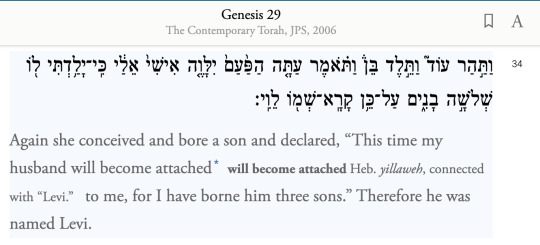

Both Levi and Isaac are biblical names whose meaning is explained in the text of Genesis. Shown here in the JPS translation, which includes in line explanations, in Genesis 29:34 we get Levi being given for its meaning as "to attach," or "to join." It shares a route with the word for wreath, so it could be said to have 'to join in a circle' connotation, which works very well with the etymology of kielce and circus, as well as the gear metaphor. He is the ringleader after all, another word that includes the connection to circles and rings.
Isaac comes from the word "to laugh". Shown is Genesis 17:19, though the incident it's referencing happens earlier. A fitting name for a clown, and even more fitting given some lines on Isaac's route, too. But again, this is a name picked based on the pun given in Genesis for it.
These are similar to Jacob in Mary Jane, which, according to Genesis 25:26 is a pun on the word for "heel". Mary names him that after getting the idea to make a doll out of corpse parts after picking up a heel off the beach.


Mary is almost certainly a biblical reference of a name, as well, but it isn't on the origin of the name and explanation for the word play involved.
These are all pretty specific references, but the pattern makes me fairly certain that all three are intentional.
Fun fact - Isaac is the father of Jacob who is the father of Levi, so this also represents three major generations of Genesis.
Whatever else he's got going on or shoved in that weird genius head of his, the Bible is clearly something in Neji's reference pool. Pretty deep-cut references too. With the "Raham" in Jire's poem, these represent some pretty close original textual readings. Some of the phrasing in the Jire poem also suggests at least a passing knowledge with Japanese Catholic liturgical phrasing or at least imitations there of.
But Neji's references don't stop here. The Oh Rama Havenna names seem to be based of Latin instead. He's dabbling in Greco-Roman mythology references elsewhere, Japanese mytho-history in I Am Death, linguistics, latin, possibly middle english, world literature, historical references and beyond. A fascinating place, Neji's mind.
So while I can totally see a reading that there's some religious background Neji is not telling us, I can also see him reading the bible from cover to cover with translation posts just for his reference pool "to make the greatest performance ever!"
#jackjeanne#jack jeanne meta#jack jeanne#sissia of the central nation#mary jane#allusions and references#shout of to Sefaria always and forever#neji#i feel like all posts about the plays themselves need a neji tag#seeing how ishida writes neji is some vindication for me as someone who came here from tokyo ghoul
12 notes
·
View notes
Text
Classic 20th Century Japanese Writers I Recommend
Over the past three years, little by little, I have begun to explore the beauty of Japanese literature. I had some reluctance at first due to the fact that the first Japanese I read was Haruki Murakami (no offense to his fans, but his writing style doesn't appeal to me). Even if you try not to be prejudiced, sometimes the brain works against you. I've taken a much further step back since then and decided to get my hands on some classics. I always liked the classics better. An apparently wise decision on my part, as I found some exceptional literary gems. I'm still at the beginning of exploration and it's a slow process (quality translations are few and far between in my country; luckily more and more classical Japanese authors are coming in lately, which brings me nothing but joy), but this is a short list of 20th century Japanese literature that I recommend.
1. Ryūnosuke Akutagawa (1892 - 1927) // Hell Screen (1918) // Spinning Gears (1927)
One of the greatest Japanese authors in history, Akutagawa is known as the "father of Japanese short stories". In my opinion, he fully deserves his title. His short stories are something unique in world literature, developing a wide variety of themes. He explores in his writings both old and new Japan, but maintaining a precious, enchanted air. Its style is easy to understand, but retains a certain poetry. Akutagawa instills in his characters an air of mystery and, in a certain way, grotesque, as if he could sense the dark side of man.
"Hell Screen" is inspired by a 13th-century volume of stories about the painter Yoshihide, commissioned to paint a screen depicting the Buddhist Hell scene. The theme of the artist's obsession with creation is a recurring theme in world literature, and Akutagawa brings it back in a new light. ”Spinning Gears” on the other hand takes place in the modern era and has a certain autobiographical feel to it. The protagonist narrates a series of events that he goes through, but these are often interrupted by his own thoughts and even hallucinations. The line between reality and fiction is finely demarcated, and the fall from one side to the other is sometimes imperceptible.
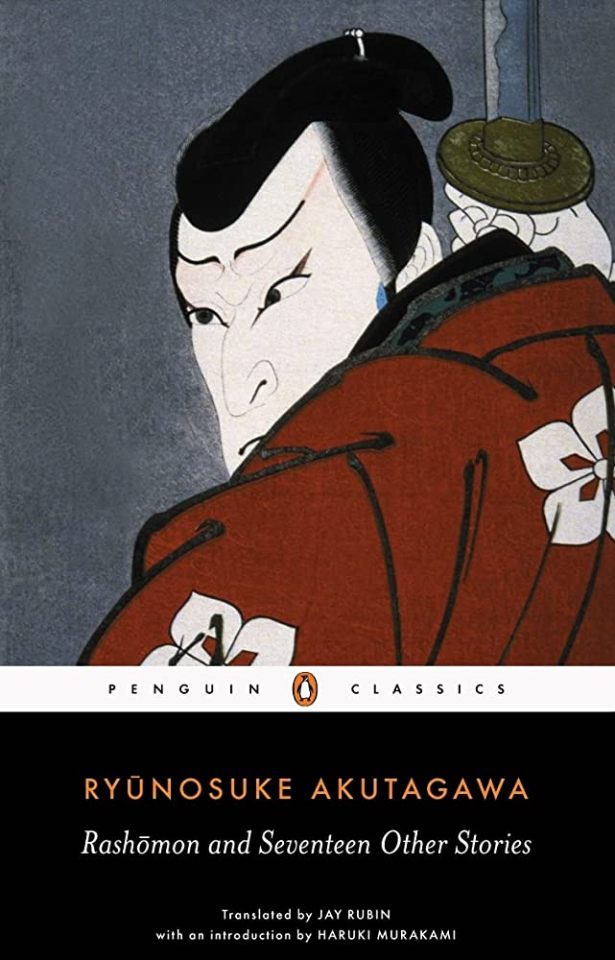


2. Yasunari Kawabata (1899 – 1972) // Thousand Cranes (1952) // Beauty and Sadness (1964)
The first Japanese to win the Nobel Prize in Literature, Kawabata is an important writer both nationally and internationally. Many of his writings have spread throughout the world. His protagonists are usually respected men, but tormented by a hidden, obsessive side that they try to curb. His style is delicate but concise, being generally devoid of unnecessary literary flourishes. Kawabata's construction is subtle and carefully contoured, knowing when to alternate shots.
"Thousand Cranes" is a short novel about a young unmarried man who has an affair with a woman older than him. Despite the age difference, the young man begins to develop an obsession with the woman, an erotic and even scary fascination in places. It is a story about passion that transforms reason, that brings horrible chimeras out of the human soul. "Beauty and Sadness" revolves around a former affair between a respected writer and a painter. The nostalgic notes of the past merge with the monotony of the present. While the central female figure is resigned and accepts her fate with simple coldness, the male figure seems to degrade at the first push and to live in a slight reverie, throwing himself into the nets of a past that only he idealizes.
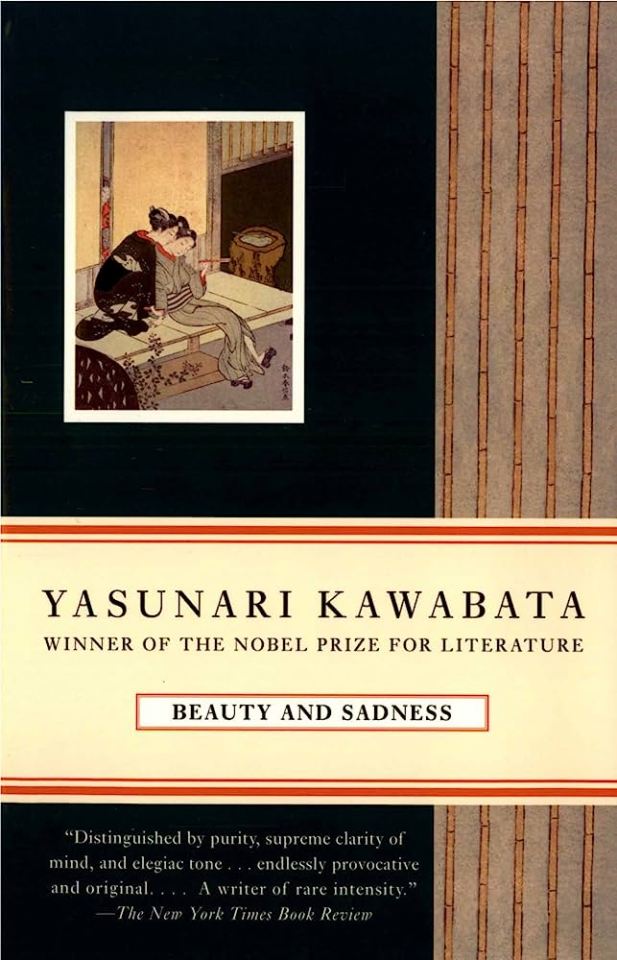
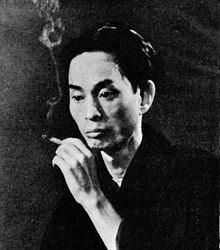
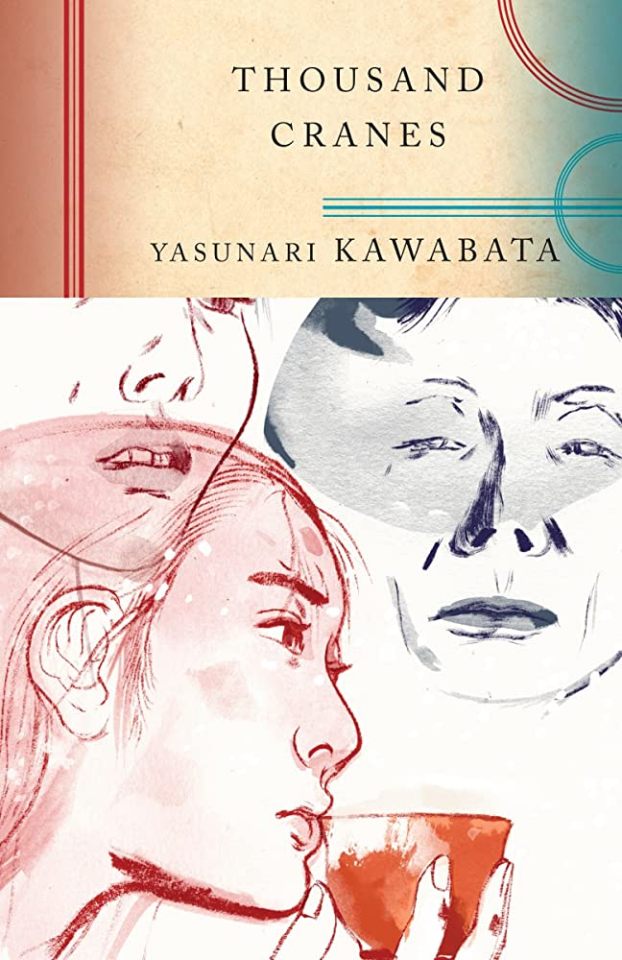
3. Osamu Dazai (1909 – 1948) // The Setting Sun (1947) // No Longer Human (1948)
A tragic genius par excellence, Osamu Dazai was obsessed his whole life with the idea of non-being. He had a latent fear of the idea of living among humans. His style is the most similar to that of Western writers among the Japanese authors I have come across so far. Like French decadents, he led a miserable life marked by alcohol, sex and suicidal tendencies. What makes him unique in literature is the way he manages to capitalize on the anguish, anxiety, fear of the human being that he suffers from and expose it in a poetic way in his writings.
"The Setting Sun" centers on a woman in her early 30s who lives with her opium-addicted brother and her widowed and ailing mother. The snake appears as an obsessive idea, a protector and a harbinger of death at the same time. The woman seems to have a corrupted soul since childhood, a tendency towards alienation, towards misfortune, towards darkness. The fear of loneliness is combined here with the fear of closeness. "No Longer Human" is a prose memoir with many autobiographical elements. The protagonist is presented through all three stages of his life, from childhood to adolescence to adulthood. The young cartoonist is terrified of the darkness within him, which turns him into an inhuman being. Despite his desperate attempts, he finds it impossible to be honest and connect with people. His life is haunted by the tragedy of a lonely soul, scared of his own self, terrified that the world will find out about the monster that lies within him.

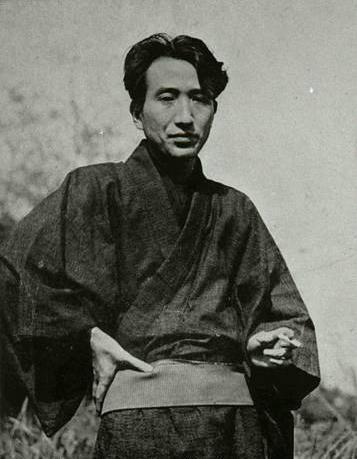

4. Yukio Mishima (1925 – 1970) // Confessions of a Mask (1949) // After the Banquet (1960)
Every country has that historical character that seems to be taken out of legends, but which was as true as it can be. Yukio Mishima is that character of Japan who is not talked about enough outside the borders. He had a tumultuous life, involved in art and politics alike. He wrote literature, essays, plays. His vocabulary is rich, lyrical, powerful. The images he conjures are terrifying, but clothed in poetry. He was not afraid to express the ideas he believed in, his political views, his observations on society, but he never forgot to express his art in a unique and sublime way. His voice is a universal voice, the meditations are of the whole world, and the freshness of the spirit is eternal. Mishima had a hidden talent for entering the darkness of the human soul and bringing out from there everything that could be both terrible and beautiful.
"Confessions of a Mask" is one of his most famous works. The young protagonist recalls his childhood and adolescence, exploring his homoerotic inclinations and the passion he develops for characters in agony. The images suggested in this prose are jarring, dramatic and aesthetic. Everything from the construction to the wording to the image is beautiful. "After the Banquet" has as its central character a woman in early old age. This is a charismatic character, slightly rude, but charming. Mishima balances the woman's free spirit with her fear of dying and disappearing without anyone to honor her memory, while a political battle rages in the background.



#dark academia#classic academia#dark academia aesthetic#art academia#light academia#art academia aesthetic#academia#chaotic academia#darkest academia#darkest academics#japanese author#japanese#japanese literature#classic literature#literature#akutagawa ryunosuke#yasunari kawabata#osamu dazai#yukio mishima#hell screen#thousand cranes#beauty and sadness#the setting sun#no longer human#after the banquet#confessions of a mask#booklr#bookblr#booklover
38 notes
·
View notes
Text
The Science Behind Great Storytelling

(Photo by Pereanu Sebastian on Unsplash)
Why do you write?
There’s probably no easy, straightforward answer to such a question. Some people write to express themselves, some to share their stories or opinions, some to inspire other people, some to educate, some even find it therapeutic. It’s a question that has both no answer and multiple, complex answers, all at once — we all write different things, for different reasons.
Nonetheless, whatever your why might be, there’s a common denominator among them all: As writers and story-tellers, we aim to transform our why into written words, in order to elicit a certain array of feelings and emotions in our readers.
What we write certainly plays a big role here, but in my humble opinion, how we write it is what makes the difference: The way you describe a murder can make the whole scene go from tragedy to comedy; the way the reader feels about a character depends on the words you use while presenting it; different punctuation can give completely different meanings to the same sentence. In other words, by learning how to write you are able to control what your audience feels while reading your work — this is why learning, experimenting, and practicing are crucial steps towards great writing and story-telling.
No surprises here, right? Everyone knows the more you write, the more you learn, and the more you learn, the better you write. It’s the well-known practice makes perfect cycle that has repeated itself throughout history and, paired with talent, has churned out some of the greatest writers of all time.
So, I could tell you to practice everyday, to read more, or to join a writing course. I could also tell you that Jane Austen’s literary style relies on a combination of parody, burlesque, irony, free indirect speech, and a degree of realism. I could tell you how Hemingway stood out from the crowd thanks to his concise, straightforward, and realistic style. If we wanted to get even more technical, I could also tell you that Shakespeare used a metrical pattern consisting of lines of unrhymed iambic pentameter, called blank verse — in short, I could tell you things you’d find in your English literature book, or things you’ve already been told a million times before.
But that’s not what I’m going to do. Instead, I’ll tell you about the science behind our readers’ emotions, the effect our words have on them while reading, and how to make them work for you:
The science
It’s all about neurotransmitters.
Technically speaking, a neurotransmitter is “a chemical substance which is released at the end of a nerve fibre by the arrival of a nerve impulse and, by diffusing across the synapse or junction, effects the transfer of the impulse to another nerve fibre, a muscle fibre, or some other structure.”
In simple English, neurotransmitters are chemical messengers: To keep it simple, all you really need to know is that external stimuli get them fired up, and according to which one is stimulated, a certain chemical is released inside your body, provoking a certain feeling or emotion.
Unfortunately, since there are way too many different kinds of neurotransmitters, we won’t be able to cover them all here. If you are interested in the topic you can grab yourself a copy of Marco Nigrini’s book “The Brain: A User’s Manual” — reading the book, I came to the conclusion that, when it comes to writing and story-telling, there are three main neurotransmitters that we can exploit: Dopamine, Oxytocin, and Endorphins.
The storytelling
It’s still, all about neurotransmitters.
Dopamine
As Nigrini puts it in his book, “dopamine is the superstar of neurotransmitters”. You have most likely heard about it at some point in your life, and for a good reason. Most people know it as the pleasure and reward hormone, because it plays a major role when it comes to experiencing happiness, our well-being and that rewarding feeling we get after doing certain things — take social media for example: Instagram likes, Facebook messages, and Twitter retweets all stimulate the release of dopamine in our brain, which is why they all become so addictive.
For us, as writers and story-tellers, the addictive properties of dopamine are perfect if we want to keep our readers glued to our work. So the logical question now, would be how do we do it?
Suspense and expectation. These two elements alone are enough to flood your readers’ neural highways with dopamine, and get them hooked to your story — creating shorter sentences, revealing vital information that the characters don’t yet know, and building anticipation, are all simple yet effective ways to accomplish this.
Oxytocin
As writers, specially when it comes to fiction, we want our readers to fall in love with our story and our characters, we want them to bond with us and our work — this is where oxytocin steals the spotlight.
To give you an example of what exactly is this neurotransmitter’s role, imagine a mother and her newborn. As we all know, the bond between the two of them is pretty much unbreakable, but why is this? In part, it’s because of oxytocin — while nursing her newborn, oxytocin is released in large amounts, thus creating a sentiment of generosity and trust between the mother and the baby.
For obvious reasons, we can’t rely on nursing our readers, so we have to stick to the next best thing: In order to stimulate the release of oxytocin in our reader’s brain, we need to create empathic characters or narrate touching stories.
Endorphins
Chocolate and sex both release endorphins — this should give you at least a vague idea of the role they play in our body. To clear up what it is they actually do though, just know that, much like dopamine, these neurotransmitters have a massive impact on your feelings of well-being, and this is what we should take advantage of: If we give our readers a more immersive reading experience, while making them feel more at ease, comfortable, and relaxed (which are all effects that endorphins have on our body), chances are they will enjoy whatever it is we put in front of them.
The good news? Stimulating the release of endorphins in our readers is way easier than you’d think — just make them laugh.
Conclusion? As with every other aspect of life, the way we experience reading massively depends on the way our brain perceives and processes information. If we, as writers, are able to understand the mechanism behind it, we can get one step closer to mastering our craft.
So remember, use science and neurotransmitters to your advantage, and develop your writing according to the feelings and emotions you want your story to elicit in your readers.
#science#writing#article#information#people#neurotransmitters#dopamine#oxytocin#creativity#creator#writer#psychology#write#science backed#endorphins#storytelling#story#telling
7 notes
·
View notes
Text
Let me tell you something I think everyone without exception needs to know.
Quick backstory, me and my friends decided to do presentation night, which means each of us will make 3 presentations about topics that we will choose.
I chose, the love of my life, Louis Tomlinson.
And I decided to have a bit of fun with that.
So I made a quiz called "Louis Tomlinson or Shakespeare."
The quiz is about quotes from William Shakespeare, the brilliant playwright and poet from the 16th century & from Louis Tomlinson, the man and the legend.
Going into this presentation I was aware of Louis' writing skills, and I know and have known for years what a lyrical genius he is, BUT.
I wanted to make it as confusing as possible for my friends and for that to work, I had to take the greatest (not the song) Louis Tomlinson lyrics.
And I think I just fell a little more in love with his lyrics. e.j
"pour, mercy, mercy on me, set fire to history, I'm breaking my own rules, I'm crying like a fool. Tall stories on the page, Short glories on the fade, I've been close enough to touch, but I never cared for love." STARTING OFF REAL STRONG,
and then we have the pre-chorus: (which I do hope to get tattooed later in life.)
"it's a church of burnt romances, and I'm too far gone to pray, it's a solo song and it's only for the brave"
And this not only being a literal piece of literature it's also very clearly, to me at least, and sorry for assuming, a queer anthem. Referencing the religious perspective on it, specifically the Catholic/christian opinion on it.
And then of course we have got the chorus.
"if the truth tell, darling, you fell, Like there ain't enough dying stars in your sky. It's a tall tale, and it's only hello, hello, no goodbye."
Which is actually perfect in my eyes. After that we have the second verse.
"pour mercy, mercy on me, I'll fall upon my knees and they'll say 'i told you so, Come on when you know, you know.' "
Which, help me god, once again sounds very clearly like a queer anthem, this time referencing the family/social circle of the person.
Then we have the rest of the second verse which is not only the most heartbreaking line I have ever heard, it is also the quote I meant to use because it reminded me of a popular Shakespeare quote.
"All the lonely shadows dances, from the cradle to the grave. It's a solo song, and it's only for the brave."
Do you understand what I'm talking about now? This man is THE poet of the century (you can also add Taylor swift to the list, the woman is a genius.) And I don't think you can even begin to understand he said all of these things UNDER TWO MINUTES??
anyways I just wanted to share my love to Louis Tomlinson and I hope you can listen to him in the future if you haven't, and continue to listen to him now if you have. Because I only spoke about 'Only the brave' but his songs are the most poetic, beautiful thing I have heard. (Yes there are songs about him having flings and taking drugs but don't everyone?;)
So there's a list of my favorite Louis Tomlinson songs that I think you should listen to: Copy of a copy of a copy, the greatest, change (this one!!), angels fly, two of us (about his late mother, bless him), walls, bigger than me, too young and basically the entirety of two his albums 'Walls' and 'Faith in the future.'
Thank you for listening to my rant! ~L
#Theres a reason his name is Louis WILLIAM Tomlinson.#louis tomlinson#louis william tomlinson#william shakespeare#writers and poets#faith in the future#walls#two of us#only the brave#love is only for the brave.#rant post#songs#louies#1d#1direction#one direction
6 notes
·
View notes
Text
7 Takes on The Double Life of Veronique
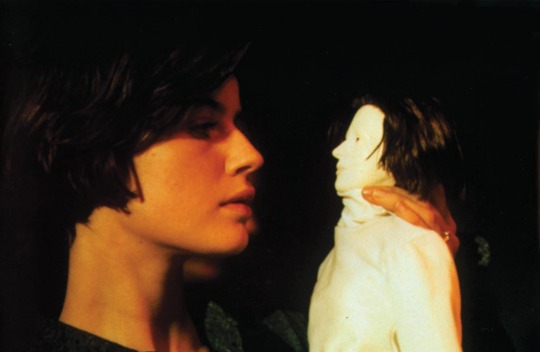
You know the thing where you like the same thing as a terrible person?
I guess even Lear-esque cringey edgelords like great movies and Keith McNally is not wrong about Sexy Beast and definitely definitely not wrong about the Double Life of Veronique, a movie I've now seen 3x, 2 of which ended in helpless tears (the only way I know if something is art).
This movie was a selection by McNally at a Roxy Cinema mini-festival in October 2023. As I told the crew who I invited (tricked?) to see the movie: now it's your turn to think about it for 15 years!
I love the moment after the movie when people are asking helplessly -- but what does the movie mean?!? And I really, really love the moment when people get angry at the end of the movie. These are real emotions! What's the last time a movie made you think anything other than "god, that was 45 minutes too long?" (The Double Life of Veronique is under 100 minutes! yessss)
[I didn't hear it cause I was, like, weeping, but my friend said at the end a guy behind us was angrily griping that the movie was too slow? Huh? Stuff is literally happening every moment of the movie? There is not a single wasted scene, line or frame? What even are these senses whose proofs we can so liberally ignore?]
Since it might be another 15 years until I see it again and I don't have the benefit of just having written a college thesis that was mostly about Lacan via Zizek, I thought I would type out a few thought exercises/interpretative frameworks that I think apply to this movie:
The contingent nature of the universe/the senselessness of existense -- probably the easiest to justify, especially in the context of Kieslowski's complete ouevre, in consideration of his personal history, based on the interviews he's given, etc...
What to do about emotional apocrypha — what do you do with and about feelings that seem to come from nowhere? Feelings are "real" and we know now (i.e. the science is now there to tell us, eg Lisa Feldman Barrets's fascinating work) they're not in any way subservient in value or usefulness to "reason"; like if anything the opposite, emotions are the "why" and reason is the very patched together and incomplete "how" behind what we are and what we do. Worth thinking about why it is Kieslowski's most compelling films have female protagonists given the historical association to the binary genders for emotion vs reason.
The duality and dichotomy of post-war East/West Europe -- I think this one is sorta obvious but not less resonant? There's a good article out there about how the film predicted a lot of the consequences of the EU. Elsewhere I've read that Polish critics pilloried Kieslowski for a traitor to his kind over this theme, which reminded me of the story about how Bach's works were sometimes not well received by the church patrons who got to hear a lot of it first because they thought it was too dour -- imagine you have the greatest musician who will ever live as your church musician and your biggest peeve is his music isn't fun enough for Sunday. In any event this is a major theme in Three Colors, and I'm sure there's no accident that this movie and the Trilogy are connected by the same fake composer (key work = "Song for the Unification of Europe"...)
Return to theory in film (Zizek) -- he wrote a whole book about it. I'm not sure I agree Kieslowski's films make the case for the return to Theory (ie I think you can interpret his movies without it.) But the fact that you can so unbelievably seamlessly integrate his films to a Lacanian framework gives me that feeling of the inevitability of Lacan.
Art Cinema's enduring interest in interrogating the limits of its medium -- which of course is also present in art literature for its own medium, and frequently not only present but foregrounded in theatre. The Puppetmaster is a clear analogue to the filmmaker (and of God, lmao...they can't help themselves), but also all the unbelievably uncomfortable sex scenes in this movie are a masterclass on the male gaze and how you constitute and undermine it...etc.
Space-time Travel (Zizek) -- right away, I'm going to say I don't think this one is all that interesting, but it's what Criterion chose to accompany the 15th year re-release of the movie. So...ok 🤷🏽♀️ I'd say that listening to physics podcasts has convinced me of the value of a literary education (those hermeneutical skills come in so handy), so I see the relevance of thinking of these two together, but I also feel like the fake math is the part of Lacan I always found a little too silly to stand.
The agony of art as vocation -- I'm sorta lazily splitting this out from #5 just because when I originally wrote this post I had 7 points and now I can only remember 6 of them, and I like the resonance of 7....There's a Badiou-esque invocation of the four types of truth procedures at work in this movie that could easily fill the pages of another unread senior thesis: science -- the zizek time travel thing, the way the movie is, actually, concerned with the explanation of what is happening and why, rather than just accepting as a premise that there can be doubles in the world; politics -- the scene where Weronika meets Veronique is at a political rally, the east/west thing mentioned above, etc; art and love, obviously.... But the key to the "plot" of Veronique's life is "Does she keep singing, even if it kills her?"
Random closing thoughts:
I'm still thinking about and cannot resolve the mystery of the subplot about Veronique testifying in her friend's divorce(?) trial. What does it mean?
One thing that always bothered me about Kieslowski is a feeling i have that his movies are slightly (high key???) exploitative of his actresses, which seems like shabby repayment for their taking considerable artistic risks. Maybe I'm just getting this feeling from applying Lacan and Zizek to his movies though (that's two dudes who definitely don't understand about women...). I'd like to think I'm wrong about this, his masterworks are all with women and "about" women. I don't think he doesn't get this, though, see again the Puppetmaster (surely one of the creepiest dudes to ever grace an art film and that's saying a lot).
#the double life of veronique#krzysztof kieslowski#kieslowski#film#movies#irene jacob#puppetmaster#zizek#lacan
14 notes
·
View notes
Text
Here is a list of the 100 greatest novels' opening lines in the history of literature *99 books from the US and UK, one tolstoj*
7 notes
·
View notes
Text
cf & dd timeline
This will not reflect every single aspect of the gilded age (1870s to 1890s) but it will include various points of historical and technological interest in addition to Nell and Steve’s personal histories. As such, spoilers will be included and updated with each chapter; so if you’d rather not deal with that, please avoid this!
Note: Italics denote events of the plot, & updates will occur after chapters are published. This is work in progress so more dates and details will be added as I think of them. Historical dates and information was provided by the National Humanities Center and my own research.
1858 - June: Samuel and Ameila Harrington welcome the birth of their son and heir, Steven.
November: Arthur and Delphine Fairchild welcome the birth of their daughter, Eleanor. (Occurs before the story starts, not depicted.)
1865 - Lincoln Inauguration, Civil War Ends, Lincoln Assassination, Ratification of the 13th Amendment
1866 - the National Labor Union was founded on August 20, First successful transatlantic cable is completed (England to the United States).
1868 - June 25: Congress enacts an 8-hour workday for workers employed by the government, July: Ratification of the 14th Amendment.
1869 - January: Grant Inauguration, Commanche Chief Toch-a-way informs Gen. Philip H. Sheridan that he is a "good Indian," Sheridan reportedly replied: "The only good Indian is a dead Indian."
May: First Transcontinental Railroad completed when Union Pacific and Central Pacific lines met in Utah solidified by a golden railroad spike to link the railroads.
September 24: First “Black Friday” stock market panic due to financier’s attempt to corner the market on gold.
1870 - February: Hiram R. Revels of Mississippi becomes the first African American to serve in the US Senate. Joseph H. Rainey of South Carolina becomes the first Black Representative, J.D. Rockefeller establishes Standard Oil of Ohio.
March: 15th Amendment is Ratified
1871 - P.T. Barnum opens his three-ring circus, hailing it as the "Greatest Show on Earth,"
March: Indian Appropriations Act - Congress declares that Indian tribes will no longer be treated as independent nations with whom the government must conduct negotiations; Native Americans legally become wards of the nation.
October 8: The Great Chicago Fire claims 250 lives and destroys 17,500 buildings.
1872 - Montgomery Ward & Co., the first mail-order business, opens in Chicago.
Nov. 5: Susan B. Anthony and other women's suffrage advocates are arrested for attempting to vote in Rochester, N.Y.
1873 - Grant’s second inauguration, The first electric streetcar begins operation in New York City; Free mail delivery begins in all cities above 20,000 population; Mark Twain and C. D. Warner publish the novel The Gilded Age.
Mar. 3: The Comstock Act prohibits the mailing of obscene literature.
Sept. 18: The Financial Panic of 1873 begins. 5,183 business fail; Congress makes gold the national standard and eliminates all silver currency.
Period of recurring epidemics beginning in 1865 comes to an end. From Boston to New Orleans, epidemics of smallpox, cholera, typhus, typhoid, scarlet fever, and yellow fever had killed thousands.
1875 - Steven begins his studies at Harvard; Nell begins hers at Vassar; Christopher, her older brother begins his final year at Harvard. (Occurs before the story starts, not depicted.)
1876 - Centennial Exposition opens in Philadelphia, celebrating the 100th anniversary of the Declaration of Independence.
Feb. 14: 29-year-old Alexander Graham Bell patents the telephone.
May: The nation celebrates its centennial by opening an International Exhibition in Philadelphia.
Christopher graduates from Harvard and goes on his Grand Tour. (Occurs before the story starts, not depicted.)
June 25: Battle of the Little Big Horn - George A. Custer and 265 officers and enlisted men are killed by Sioux Indians led by Sitting Bull and Crazy Horse at the Little Horn River in Montana.
1877 - Hayes Inauguration, Reconstruction ends with the withdrawal of federal troops in the south, Great Railroad Strike: After West Virginia railroad workers strike to protest wage reductions, sympathy strikes and violence spread across the Midwest. Federal troops break the strikes.
June to Oct.: Nez Percé Indians, led by Chief Joseph, surrender after a 1600-mile trek retreating from U.S. troops through the U.S. northwest. They are sent to a reservation in Indian Territory (Oklahoma).
Thomas Edison patents the phonograph.
Christopher Fairchild weds Marian Hudson. (Occurs before the story starts, not depicted.)
1878 - German engineer Karl Benz produces the first automobile powered by an internal combustion engine; Thomas Edison patents the photograph.
Jan. 10: The Senate defeats a woman's suffrage amendment 34-16.
Steve graduates from Harvard University. (Occurs before the story starts, not depicted.)
1879 - The Carlisle School (Pa.) is opened “Americanize” Indian children.
Feb. 15: Congress grants woman attorneys the right to argue cases before the Supreme Court.
Oct. 21: Edison invents the first practical light bulb.
Steve travels Europe on his Grand Tour; Nell returns to France upon news of her parent’s ill health. (Occurs before the story starts, not depicted.)
1881 - Helen Hunt Jackson's Century of Dishonor recounts the government's unjust treatment of Native Americans.
January: Christopher and Marian Fairchild welcome the birth of their son and heir, August.
May: Steven returns to New York from the Continent; begins working with his father at their various real estate holdings. (Occurs before the story starts, not depicted.)
July 2: President James Garfield is shot by Charles Guiteau, a disgruntled office-seeker. He died on Sept. 19.
July 4: Booker T. Washington opens Tuskegee Institute.
July 19: Sitting Bull and other Sioux Indians return to the United States from Canada.
September: Arthur and Delphine Fairchild pass away after battling tuberculosis; Christopher takes over the family holdings and arranges for his sister to travel back to New York from France; Marian begins paying calls to the Four Hundred and laying the groundwork for Eleanor’s societal debut. (Occurs before the story starts, not depicted but mentioned.)
1882 - Attorney Samuel Dodd devises the trust, under which stockholders turn over control of previously independent companies to a board of trustees; Standard Oil Trust, the first trust, is formed by John D. Rockefeller.
May 6: Congress passes the Chinese Exclusion Act, barring Chinese Chinese immigration for ten years.
December: Eleanor arrives in New York from France entering her half-mourning period and Steven has one-sided meet cute; news the arrival spreads quickly; her debutante ball to be held at the Fairchild manse on 5th Avenue is the talk of the town. (Chapter I. Coup de foudre - story begins here.)
1883 -
January: Mrs. Astor’s annual ball, the most anticipated event of the season, is held; Nell and Steve both receive invitations.
March 26: Mrs. Vanderbilt, feeling snubbed by The Four Hundred, throws her famous masquerade ball, commemorating the completion of her new Fifth Avenue mansion, Petit Château; Nell and Steve are once again invited to the masquerade, but Nell is warned by Marian to keep her distance from Mr. Harrington; each invite has instructions to dress as their assigned characters. (Chapter II. Traîner quelqu'un dans la boue)
3 notes
·
View notes
Text
Tyrion Lannister month: narrative
It is a common knowledge that the narrative of the asoiaf series favours the underdogs. In Grrm's world, we do not have the benevolent king/lord who is the just father of the nation; in fact the one who kind of emulated this role gets his head cut off within the first book itself. We do have a prince on a quest, though this time he won't be returning to a sonorous welcome, rather he would die a painful and lonely death after being almost cooked by dragon fire. The one who had mourned his lord (his unrequited love) for years, perhaps won't go down in history as one of the greatest vassal lords who had ever lived ( as one of the greatest lovers): but rather as one who perhaps again would cause a tragic massacre.
So yes, Grrm distorts his traditions to tell a tale anew. And one such distortion is to posit Tyrion Lannister: the dwarf, the halfman as a hero.
I am not too familiar with European fairytales ( my range only extends to that of Disney) or much of literature in general, but often times Tyrion meta writers have said that Grrm has tried to move away from the trope of the dwarf being a lecher, a wicked being in such tales and has given him a nuanced and very humane depiction. So what is Tyrion's narrative about?
I think what Grrm does here ( among other things, since the narrative given to each is manifold), is make a commentary on how the asoiaf society views violence. The only reason that Tywin hates Tyrion so much is because he is the most capable of his children to be the heir of the Rock. But Gods are cruel and to "teach" Tywin humility did they make Tyrion a "half-man". And Tywin has to bear seeing him "widdle" about. These choice of words prove that Tyrion is resented not for his proclivities ( we see the great Tywin Lannister himself sharing bed with a sex worker), but because of his disability. And his disability matters because in the barbaric feudal society of Westeros it means that he wouldn't be able to perform violence as he is expected to ( riding into war, participating in melees etc). This is similar to Randyll Tarly's abuse of his son; Sam's blood doesn't sing at the thought of killing, maiming, hunting. He is therefore an anomaly of nature- someone who belongs at the end of the world.
Westerosi society has a very particular idea as to who has the right to violence and who isn't. Robb is the young wolf, the king in the north, who has risen to avenge his father's death. Greatjon Umber doesn't mind that his two fingers were bitten off by a direwolf because Robb, the heir is permitted this violence.
Jon Snow on the other hand is the bastard, a child of lust and hence the only way Catelyn could breathe a sigh of relief is when he chooses to bind himself to a order that he can't desert ( it would mean death). It is not unnatural that she should be worried about any contest to her children's claim but her conviction in the what ifs...what if Jon makes a move against Robb, what about her grandchildren, all of it speaks for the fact that bastards aren't allowed violence. They are to be treated with distrust and kept on a short leash.
Bran stands on the other end of the spectrum by the side of Tyrion. He dreamt of being a knight and Jaime's callousness cost him the dream, bringing with it the albeist distaste of the Westerosi nobility. Much like Tyrion, Bran won't be winning a name for himself as a knight. He won't be learning the ways of war as a squire and so when left in charge of Winterfell, he has to deal with the pitying looks of his father vassal lords and snickers of boys his age.
Leobald seemed surprised that he had spoken. "I'm grateful, my prince," he said, but Bran saw pity in his pale blue eyes, mingled perhaps with a little gladness that the cripple was, after all, not his son. For a moment he hated the man.
The point of my constant reiteration of the same lines is this: Tyrion is hated, mocked and dismissed because he is physically incapable of performing what the Westerosi society expects him too ( much like Arya and Brienne who incidentally are not traditionally allowed to commit any violence). They cannot see beyond the limits they have bound themselves in. The sons of lords (and yes only the sons) need to learn the art of war, should they in future have to participate in the same ( be it in defense or offence). So the cripples, dwarfs and "cowards" are looked down on and treated as failures. Ironically enough within the course of the series we already have had the "coward" successfully push the bastard into the much deserved position of a commander, we have had the dwarf save a city and in due course we will have a cripple save the world.
Tyrion's narrative is precisely then another cog in the wheel of the coming of a new age.
58 notes
·
View notes
Text
It's time to talk about the greatest love confession in all of literature (courtesy of David Copperfield) 💘

(A/N: Look at them folks! True love right there!💕)
Hello friends, I am working on an ask in which this suddenly became relevant (I promise it's not just completely random😅) so I feel that the time has come to discuss the greatest, most romantic, and most swoon-worthy love confession in all of literary history! (In my personal opinion anyway).
It is from a very old and criminally underrated book titled The Personal History, Adventures, Experience and Observation
of David Copperfield the Younger of Blunderstone Rookery most commonly referred to as just David Copperfield which was published in 1850 and written by classic novelist Charles Dickens (who is probably most famous for writing A Christmas Carol). It is not a romance novel (but it does have a romance subplot), so it is generally not discussed when talking about the greatest love confessions in literature. Therefore, I have taken it upon myself to make a big long meta post about it. Ramblings below the cut!
(Warnings: Spoilers ahead for David Copperfield which was published in 1850. It also has a few great filmed adaptations including an excellent BBC one from 1999 with Maggie Smith, and a new one (2019) with Dev Patel that gets so many extra kudos for cutting out most of the infuriating love triangle and making David Copperfield less oblivious. Power move! But that did change this confession sequence in the movie so I suppose that's a downside but I digress...Some spoilers for the 2019 movie below as well)
David Copperfield is not a romance novel by any means, but there is a romance subplot and a positively swoon-worthy love confession at the end of this book in which the main character, David Copperfield, finally expresses his love to Agnes Wickfield who has been his best friend and has stood by his side since childhood and who we (as the reader) know has always been obviously, desperately in love with him. Unfortunately, David Copperfield is a dumbbell (I say with the utmost affection) and one of the most oblivious fictional men of all time (My sisters and I like to call him the "OG Oblivious Fictional Man," and he is the standard to which we compare all other oblivious fictional men. To this day we have only found nine (9) fictional men we consider more oblivious than him but that is another story).

David doesn't know how he feels about Agnes for literally around 700 pages which span decades of his life, and then when finally confronted with the possibility that he could have romantic feelings for her, he freaks out and runs away to go on a soul-searching journey in the mountains. He eventually comes to terms to with the fact that he loves her and then proceeds to freak out that she could never return his affections...
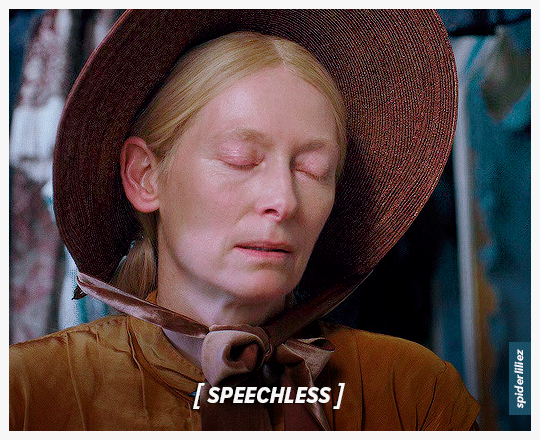
Anyway...bless David--he goes to visit her several times trying to pluck up the nerve to confess. Agnes meanwhile is trying to guard her heart from yet from another rejection. David, for his credit, picks up on her hesitation (progress!) and believes she has "a secret" though he doesn't quite put all the pieces together. He has some really incredible lines here one of my favorites of which is:
"My dearest girl, dearer to me than anything in life, if you are unhappy, let me share your unhappiness. If you are in need of help or counsel, let me try to give it to you. If you have indeed a burden on your heart, let me try to lighten in."
But Agnes has literally been "sister-zoned" (as in "you're like a sister to me" which is beyond friend-zoned) for 700 pages and even completely rejected for another woman, the nice but completely airheaded Dora who has since died (A/N: in the 2019 movie, Dora lives but David dumps her because they are incompatible and he actually loves Agnes which is what he should have done in the book). Anyway, after all of that, Agnes can't even allow herself to hope that her romantic feelings for David are finally being returned. She says, "If I have any secret, it is--no new one; and is--not what you suppose. I cannot reveal it or divide it. It has long been mine and must remain mine."
David starts to connect the dots (FINALLY) and confesses his love to her even though he swears up and down that he "thought that nothing could have wrestled this confession from [him]." He has quite the speech (which I won't type out completely here), but it ends:
"I went away, dear Agnes, loving you. I stayed away, loving you. I returned home, loving you!"
I am sorry to have to tell you all that even after all of that, hopelessly oblivious David is still beyond nervous and concerned that Agnes does not return his affections. But this, my friends, is where we get to the pinnacle, the end-all-be-all moment of the most swoony-worthy confession in all of literary history. Agnes who has quietly, unquestioningly, and unrequitedly loved David from their childhood sees all of his fears and insecurities in having confessed to her and tells him there is "one thing [she] must say." David is so nervous that he is about to get rejected and timidly asks her what it is not even daring to hope that she is about to return his affections but...
"She laid her gentle hands upon [his] shoulders, and looked calmly in [his] eyes.
'Do you know, yet what it is?'
'I am afraid to speculate on what it is. Tell me, my dear.'
'I have loved you all my life!'"
And that is how it is done, friends! Thank you for coming to my Ted Talk.
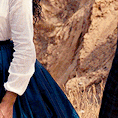
(A/N: I found all these great gifs from the 2019 movie, and I got so excited about including them😅)
#the personal history of david copperfield#david copperfield#agnes wickfield#david copperfield: og oblivious fictional man#the most swoony worthy love confession in literature#i don't usual like romance but this is probably the most inspirational piece of romance writing to me#david copperfield meta analysis#acacia's ramblings
13 notes
·
View notes
Text
Gathering of the Greatest Gumshoes - Number 24
Welcome to A Gathering of the Greatest Gumshoes! During this month-long event, I’ll be counting my Top 31 Favorite Fictional Detectives, from movies, television, literature, video games, and more!
SLEUTH-OF-THE-DAY’S QUOTE: “No matter what the anthropological reasons, we fight to make the world a better place.”
Number 24 is…Bones Brennan, from Bones.
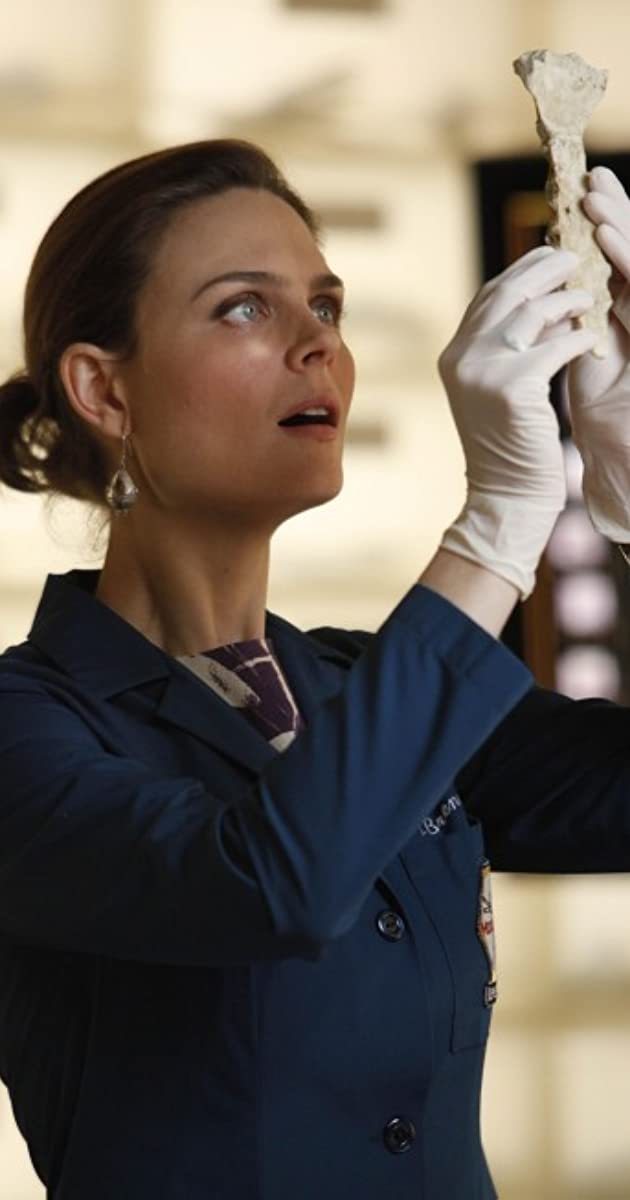
“Bones” is a show that kind of toes the line between a typical, old-fashioned detective series, and a show more akin to the aforementioned crime dramas “NCIS” and “CSI.” In terms of style and such, it feels more like one of those series, but the way the cast and storytelling of the show is constructed – focusing on the adventures of a singular detective figure and their sidekick, trying to solve baffling crimes that often seem impossible to solve – feels more “classical” in nature. This blending of styles and period elements is part of what makes the show so interesting. The character of Dr. Temperance “Bones” Brennan herself is another part.
Dr. Temperance Brennan is a forensic anthropologist, with a general interest in anthropology as a whole. Referred to as “Bones” by her colleagues – most notably her partner in the field (and later partner in life), FBI Agent Booth – she is one of the most socially detached people you could ever possibly meet. While not necessarily cruel or deliberately unpleasant, she is a very by-the-book kind of person in the laboratory, and is heavily grounded in her beliefs. She immerses herself totally in science and history, in just about every aspect of her life; she sees many emotions and attachments as essentially the results of chemical formulas and natural inclinations, and she refuses to acknowledge things like religion or mythology as having any proper bearing in reality. She fails to understand a lot of basic social cues in human interactions, doesn’t get most pop culture references, and is equal parts unflinchingly stubborn and HIGHLY passionate about her work. Because of all this, it’s hard for Bones to form friendships, or even romantic interests…but as the series goes on, we see the character grow and develop, becoming increasingly more comfortable in social environments, and becoming closer to her teammates…especially the aforementioned Booth.
Booth, for the record, is a pretty good detective, himself, but it’s really Bones who acts as the Sherlock Holmes of this universe. In fact, the character seems to take a lot of cues from Holmes, and even quotes him a few times; both are eccentric geniuses who don’t always exhibit proper social graces, and have a detached mental and emotional outlook on the world as a result of their own strange minds and origins. Booth is, fittingly, Bones’ Watson…if Watson and Holmes fell in love. (Step away from your keyboards, fanfic writers.) I really love their relationship, as Booth is sort of the polar opposite of Brennan: a very emotional, generally more “loose” kind of person, who, while not a complete moron, doesn’t fully grasp a lot of the technical aspects of his partner’s scientific study, and is equally stubborn in a lot of his own convictions and beliefs. As time goes on, the two go from “frienemies” to a truly loving crime-fighting couple. If the romance isn’t of enough interest to you, then the mysteries they solve will be.
Also, Bones got to work with Ichabod Crane in taking down zombie revolutionary war soldiers. (pauses) No, that is not a joke. Look up the two-part crossover with FOX’s “Sleepy Hollow,” which was split between an episode of “Bones” and an episode of the other show. Freaking awesome to see two such totally different crime dramas pair up in those stories. For the sake of Washington Irving, if you’re not gonna watch anything else from this show, at least watch those episodes, they’re hilarious. XD
Tomorrow, the countdown continues with Number 23!
CLUE: “Mess and I are very old friends.”
#list#countdown#best#favorites#top 31 fictional detectives#gathering of the greatest gumshoes#number 24#bones#bones brennan#temperance brennan#tv#television#mystery#crime drama
3 notes
·
View notes